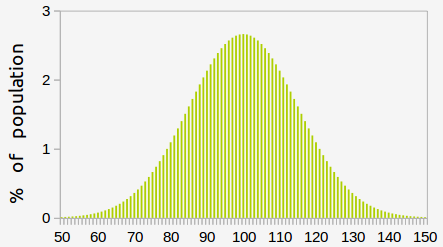Results from the FSIQ v3.0.
IQ scores
< 70
< 70
< 70
< 70
Score Interpretation
The idea with IQ scores is to allow comparisons across different tests and to the general population. So scores are converted from raw scores to a new scale where the average score in the population is 100 and the population is distributed as shown in the graph below.

In statistical terms, the raw scores are rescaled so that the scores for the general population have an average of 100 and a standard deviation of 15.
The tricky thing with on-line IQ tests is that the people who take them are not the general population. People who like and are good at tests are more likely to take them, so the results have to be adjusted. The IQ scores reported here are adjusted on the basis of self-reported scores on proctored IQ tests and college entrance exams of people who took the optional research survey at the end.
Correlations with other tests
Direct comparisons
This test has actually been studied by university researchers unaffiliated with this website. This is pretty unusual for an internet test. Katie Logos, Neil Brewer, and Robyn L. Young (2021) tested 64 undergraduates in lab with the WAIS-II and this test. The average FSIQ on the WAIS was 111 and the average FSIQ on this test was 107. So it looks like the difficulty of this test is not much different than the WAIS. The correlation between the two was r=0.57. This is lower than the correlation between the WAIS and the 2nd most popular IQ test which I calculate to be 0.67. So, this test does not appear to be as reliable as the top two professional IQ tests, but gets somewhat close. And this is expected as this test is designed to take much less time (15 minutes, versus 75 minutes for the WAIS).
Indirect comparisons
Among takers of this test who reported an ACT score (n=398), the correlation with FSIQ on this test was r=0.55. Baade & Schoenberg (2004) summarize 5 studies that correlated ACT scores with Wechsler Adult Intelligence Scale FSIQ and the average was r=0.73.
[social media plugins not loaded until requested.]